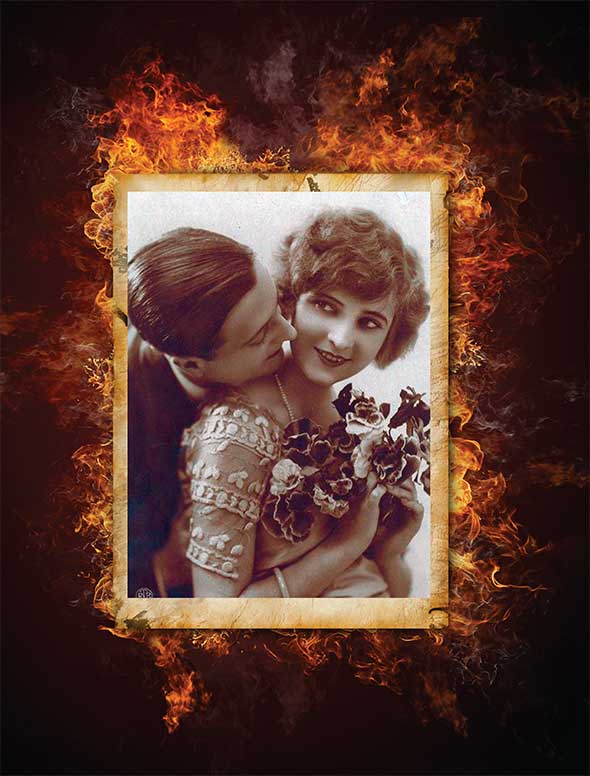
How is it that she’s come to this? From flapper to frump, sitting here in an oversized sweater, the color of cerulean blue, her hair a frowsy tangle — though just now she doesn’t care about that. There’s sun in her chest that’s pushing out through her limbs. She’s still. Warm.
She knows this place, this white windowless office, is not where she belongs. But she’s not sure where it is that she does.
From behind his desk, Dr. Carroll is asking her another question, as Zelda, stretched out on the couch, gazes out the window, seeing sunlight slice through gray.
Scott is there, but Dr. Carroll doesn’t see him — isn’t it strange, with his presence so clear? He’s to her right, slouched in a chair, squinting from the light. He’s silent but she can tell he’s judging her thoughts.
She stares over at him, questions in her eyes, but his face is a wall she keeps coming up against.
Dr. Carroll never quits, prodding and poking.
“Excuse me?” Zelda asks.
“I was asking if you’d care to talk more about your childhood — your parents, for example?”
“Not particularly, doctor. But if you insist, I’ll do my best.” She bats her eyes at the good doctor. Such a proud and puffy little man.
“Yes, Zelda. Tell me about your father.”
She lights a cigarette. “My father was a judge, Old Dick we all called him. He never really approved of me.” She rushes on, breathlessly, “Scott always remembers him chasing me around the table with a carving knife that time at dinner. But really he wasn’t as bad as all that.”
Scott is still slouched in the chair to her right, his hand curved toward him, inspecting his nails. So strange how the doctor never even glances his way.
The doctor’s face flushes in alarm. “Your father chased you with a carving knife? Why do you think that was, Zelda?”
Zelda laughs, waving her hand in dismissal. “Oh, who knows? I was probably being sassy. It was right after Scott and I were married, so I ’spect we were all getting used to things. Don’t worry, Doctor. Father knew I was a fast runner.”
She can tell that sometimes the doctor doesn’t know whether she is fibbing or not. Honestly, there are moments when she isn’t sure herself.
“I suppose you want to know about how he was when I was growing up, that sort of thing?” She flicks the ash from her cigarette into the brass tray.
“Yes, Zelda. That would be fine.” Dr. Carroll runs his fingers through the little hair he has left, then adjusts his glasses and straightens in his chair.
“Well, he mostly stayed out of the way, too busy with work, you know, which was fine by Mother and me.”
She closes her eyes and she is there again: a small child in a white sundress, golden hair glinting in the sun, running through the field of yellow daisies. She smells the bright new grass and onion weeds blended with clover. Her mother sits in the shade on a white, paint-chipped bench, fanning herself and reading Harper’s.
“Look how fast I can run, Mother.”
“Yes, darling. You certainly can.”
Read all six winning stories from The 2016 Great American Fiction Contest
Winner
- “Zelda, Burning”
by Celeste McMaster
Runners-Up
“I can beat the boys.” She runs and runs straight through the field, faster and faster until she tastes the sweat on her upper lip and the wind cuts deep down in her throat. Throwing herself into the tall weeds, she rests for a minute. Her mother, used to toting Zelda home covered in grass stains and bruises, never minds in the least if she gets dirty. Zelda’s days consist of doing exactly what she wants, when she wants. Swimming and diving, those she adores — darting into the water like a tiny exotic fish racing through the blue of the pool, water pulsing in and out of her ears. And then some days, after she’s beaten the boys in that, too, they bicycle or roller skate home and Mother has warm cookies and lemonade for all. At night she catches fireflies with the boys and falls asleep to the smell of the pear trees in their yard.
“Zelda.” A voice like her father’s calls to her, but she’s not ready to go back home yet.
“No. I’m with Mother now. I still want to pick flowers.”
“Zelda.” It is Dr. Carroll. “You are drifting away again. Remember how we discussed the importance of focusing, of staying in the world of the real?”
Scott is sitting straight up in the chair now, staring across at her, as if he is waiting too.
“But Doctor, the fantasy world is so much nicer.”
She has been a good girl, even helping those patients who need assistance in exercise and dance, and so has earned a hike in the steamy late afternoon near Sunset Mountain with Dr. Carroll’s assistant Landon. The rain begins to thump down on her head, but Zelda does not mind; she is thrilled to be outdoors, comforted by the dank, dark woods.
“Let’s make a fire,” she suggests, and begins rifling through the bark and briar patches, choosing pieces of kindling.
Hypnotized by this fire, Zelda thinks of others. There were the sharp smells of burning eucalyptus from fires behind the beaches on the Riviera. Those were happy times, with her French aviator — his strong body lying next to hers as they watched the sun set, smelling the cool breeze from the ocean, the smoky sharp scent that made her feel so alive … then there were the fires that she had set in rage, whenever Scott had hurt her, or whenever she simply needed the closure that comes with flames — igniting her clothes in an old fireplace (nearly burning down the house in La Paix in the process), or in an old bathtub when Scott was on the prowl.
Walking back home in the dusk, Zelda looks ahead to the moon glowering over the mountain trees in the direction of the Grove Park Inn. She thinks for an instant of when she stayed there with Scott for their wild honeymoon and all the other times they stayed there as lovers and partners in fun. They were excitement eaters in those days — riding around on the tops of taxicabs, coming in at 3 a.m. They made a picture, the two of them — better than movie stars.
As the hospital comes into view, Zelda notices something she hasn’t before — a gray stone well on her right. There’s something mysterious about it, spooky. As she approaches, from deep down below, a voice calls to her.
“Zelda.” It’s Scott’s voice, muffled. “Zelda, it’s me. I’ve come to see you. I’m down here. Come, jump. Dive like you used to.”
“Scott, what are you doing down there?”
“This way we can have some privacy, baby. Come on and jump. There’s a golden kingdom that goes through from here — all to way to China!”
Zelda moves closer to his voice, but just as suddenly, arms grab at her, pulling her back, back, back. She struggles and screams, lashing out against them, but they still carry her, fighting, away.
She’s not altogether sure how she came to be here, sitting on the sofa in this bright white room. Dr. Carroll looks at her from over his glasses.
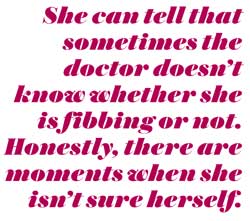 “Tell me, Zelda: What do you remember about your hiking trip yesterday?”
“Tell me, Zelda: What do you remember about your hiking trip yesterday?”
Zelda sits dazed. A couple of minutes pass. “I had the chance to be with him, Doctor. That man pulled me away. You’re all trying to keep us apart.”
Dr. Carroll draws his eyebrows together, making one long caterpillar of them. “Trying to keep whom apart, Zelda?”
“Me and Scott.”
Dr. Carroll looks weary. “Zelda, you know Scott died a few years ago.”
But Scott will never die, she knows. Why just the other day, when she was out visiting friends, he sat right beside her at the dinner table and told her the train would depart late, and sure enough, it was a good 30 minutes behind schedule. Her Princeton man. The King of Roses. He’d pursued her when she was just a girl, just a beautiful girl in a frothy tulle dress. How jealous the other girls were of her, how envious her boyfriends were of him. Right up until the very last minute she’d kept them all guessing whom she’d choose. She recalls standing around at the pool, the evening before her marriage to Scott, dressed in her flesh-colored swimsuit (rumors quickly spread that she’d been naked). Spinning around, eyes closed, arm outstretched and finger pointing, she’d taunted, “Whoever I stop on, that’s who I’ll marry.” The boys scrambled around to have a better chance of being chosen.
Dr. Carroll clears his throat, pulling her back. Zelda has noticed that he has an annoying little habit of doing this when she drifts.
“Let’s talk about your paintings, Zelda. They’re very impressive. Tell me about this one.” He holds up a watercolor of a naked woman lying fallen on stone steps. Underneath her hips and legs are gold coins. Ornate gold pots stand tall beside her. In the shadowed corner, a gray phantom figure dressed in brown holds a jar containing large white moths that exit and fly into the space. An amber city gleams through the archway in the background.
“Oh, that’s from a parable Jesus taught his followers: ‘Do not store up treasures on earth.’”
“I see. Zelda, why is it that the hands in all of your paintings, this one included, are so large in proportion to the bodies? They seem slightly disfigured — overpowering and grasping.”
Zelda turns her head, considering the painting for a few seconds.
“Well, I’ll tell you, Doctor. I’m just not that good with hands.”
She believes that the things she sees in the clouds are hers alone — no one else can pinpoint the Degas dancers tying their point shoes, or see the faces of zinnias, the tufts of the beard of Moses, the snowsuit-padded child zooming down the hill on a sled, and other scenes — the backs of knees, for instance, or the intertwined bodies of lovers — that are not polite to mention, but that she mentions nonetheless, whenever she has the chance to leave listeners in stunned and open-mouthed silence. Zelda knows, by intuition, that, say what they may, no one can give life to these shapes better than she.
Earlier that afternoon she lay alone in the grass just beyond the hospital, staring up at the clouds. Scott had been there briefly, sitting to her right, arms wrapped around his knees. Writing in his leather-bound journal — the one she smelled even when he wasn’t around. He’d look up from time to time, but his thoughts were on his work, not on the sky. Finally, he’d gotten up and wandered dreamily up the hill, journal in his back pocket, leaving her alone.
Now, in the spacious wooden-floored room devoted to arts and exercise, Zelda works at her easel. She always chooses to set up in front of the window that has the best light, and today it is the one in the left-hand corner, where the sun’s rays stream down like warm honey from behind the clouds and through the large glass panes. On her palette, she mixes the different shades of browns and pinks. The smell of the oil paint stings her nose and provokes in her a heightened sense of awareness. As she mixes, Zelda sees from out of the corner of her eye a patient meandering towards her. The woman appears to be, like Zelda, in her 40s. She has left the group of men and women at the craft table at the far end of the room and comes to stand beside Zelda. The patient’s hair is unkempt and she sucks her thumb, drool running from the corners of her mouth. Her clothes sag and hang, and she stares blankly at the canvas.
The woman takes her thumb out of her mouth. “Whatcha gonna paint there?”
“Ballet dancers.” It is a painting of two Picasso-esque figures, male and female, and Zelda, ignoring the intrusion, turns to her canvas and blends brown paint, shadowing the woman figure’s outstretched arm. Both dancers are naked, with the exception of the pink ballet slippers the female wears. In her hands are the tutus she has discarded — a white one in the outstretched hand, a pink one in the left. The woman stands over the man who is facing backwards with arm curved over his head, crouched under the female’s arm as if being banished. The two figures’ features blur together and the legs, arms, and hands are stretched out of all proportion, for this is how dancers feel after dancing.
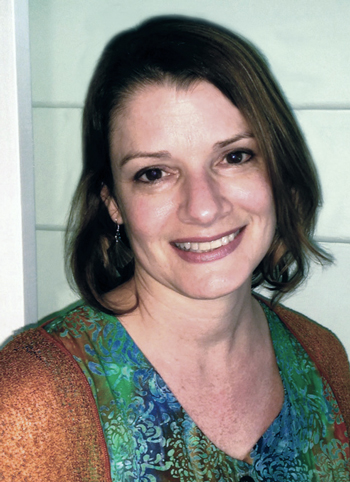
Meet the Winner: Author Celeste McMaster
Her fascination with Zelda began with a research paper.
Click here to enter the 2017 Great American Fiction Contest now.
As Zelda uses her fine-point brush to outline and shade the female dancer’s limbs, she reflects back to her days of intense training at Madame Egorova’s studio. How Madame’s presence infused life — that luminous chandelier-brilliance of beauty and hope — into Zelda! How her manic days of practice at home — her work at the barre and mirror she had installed into her and Scott’s apartment at which she worked nonstop, even talking to friends who came to visit them as she rehearsed — were well-worth a single word of praise from the tall, dark-haired, brilliant Madame Egorova with whom she was a little bit in love. And dancing itself stretched her muscles, her mind, her soul. It seemed to her then that only through daily disciplined movement could she beat back the demons.
“Third-rate.”
Zelda whips around, startled that the voice is not the patient’s, but Scott’s. He is dressed in a relaxed suit and tie and wears his hat at an angle. Leaning, one leg crossed over the other, on a wooden column, he smokes a cigarette and observes her painting.
“You’re a third-rate artist, Zelda, just like you were a third-rate dancer, and writer, for that matter.” He blows the smoke through his mouth and nose, his eyes boring into hers.
“Scott, please. You’re not supposed to be here. You’ll get me into trouble again, and then they won’t let me out to see Mother. Let me paint. This is all I have left.” Hands trembling, she returns to the dark brown floors of the stage, a space that does not require particular steadiness.
He sneers, “Save Me the Waltz. I can’t believe you had the audacity to publish it. Taking my material like that.”
Zelda spins around to face him. “Your material? It was both of our lives, wasn’t it? You talk about audacity after rifling my journal, after lifting my own words from my letters to you and you alone for your stories and novels? Go away!”
He disappears and in his place stands the female patient, still sucking her thumb. But now her eyes are large and she moans as if she might break out in frightened sobs. The nurse in charge of the crafts table hurries to the scene. “Zelda, is something the matter?”
The patient runs forward, turning away from Zelda and clinging to the nurse.
“No ma’am, but this woman is disturbing my concentration. Would you please escort her back to the table?”
As the nurse shepherds the patient back to her fold, Zelda cleans her brush and dips it into the dark pink paint, refocusing her attention on the creases of the tutu and the ballerina slippers.
She wants to stick out her tongue at the world. She’s always had the impulse, ever since she was a child, and that’s how she feels at this moment, at age 47, now that she’s out of that wretched hospital at last, puttering away in her mother’s garden, digging up clods of dirt with her trowel. Raking her fingers through the earth, breathing in the rich dark soil, she feels the sun’s rays begin to heal her tired body. When she first came there was one lonely jonquil outside her bedroom window, but now, she looks proudly at all she has planted — crocus, jasmine, lilies, larkspur, phlox, marguerites. Lifting her face to the sky, she sees dark, menacing clouds moving closer and she smells the oncoming rain.
Though it is March and springtime, the evenings are cool and she and Mother still make fires in the hearth. Zelda can sit for hours, just staring into the fire, imagining in the orange and blue flames the shapes and faces that meld together in her dreams.
The next day, after a lunch of fried chicken and mashed potatoes with her mother, Zelda, in unusually good spirits, decides to walk to town to see a painting in a gallery she read about in the paper.
“Be careful, Zelda,” her mother calls to her as she heads out the door.
“Really, Mother, it’s fine. I believe I’m finally getting better.” Dressed in a dark green velvet gown, purple scarf, and black bucket hat, Zelda sets off. The air is crisp and clean after last night’s rain, and the wind refreshes and lifts her spirit.
Rounding the corner a couple of blocks from her house, she spots two young boys sitting on their bicycles talking. Zelda thinks how adorable they are in their coats and caps and remembers how she would dress little Scottie in her jacket and boots before she went out to play.
As she passes by the pair, she overhears one say to the other, “Hey, Jack. Look! That’s the woman my ma said was talking to herself and yelling at imaginary folks in the street the other day.”
Zelda increases her pace until she is safely out of earshot and then slumps onto the steps of a vacant apartment, her eyes stinging. She didn’t know she had been yelling, only communicating. How many people had seen her? Did her mother know? Wrapping her scarf tighter around her face, she returns home by a different route.
Back she goes to Highland Hospital, in spite of her good intentions to be well. Although the stone walls and antiseptic smells oppress her, she has come to look on this place as a refuge from the world’s expectations of sanity. In a tiny white room on the wing of the first floor, the nurse, a girl — young, lovely, but with a bit of the pinched, hassled look about her — is giving her an injection. Zelda is not sure what it is, but silently submits, desirous to be left alone with her thoughts.
“Goodnight, Mrs. Fitzgerald,” the girl says.
Zelda simply looks at her.
Left alone, she feels restless. Flopping like a fish in her bed, she wonders abstractly if anyone is surprised she is back here. She certainly isn’t. Zelda remembers telling her mother, just before she got in the car to be taken back to the cool air of Asheville, “Don’t worry, Mother. I’m not afraid to die.” And she is not. She thinks of death as all pure and white and golden, where she eats honeydew melon and drinks dope with boys who once again adore her.
Out of the darkness she sees a section of light under her door and a voice calls to her, “Zelda. Zelda!” He has come for her at last. They told her he was gone, but she knew he would come for her.
“I’m coming, Scott! Hang on.” Just like him, when he was tight — yelling like that, loud enough to wake up the whole place. This time, she determines to appear very glamorous when she meets him. No more crazy old woman. Oh, no. Searching through her closet, she finds a short black dress with a fringe at the bottom. She pulls out her string of beads and straps on her black heels. Oh, where is all this coming from? But she doesn’t care, she is happy. Finding a mirror under her bed (somehow she knows just where to look) and some mascara and rouge and red lipstick too, she puts on her Elizabeth Arden face. That nurse has more gumption than she’d imagined, leaving all these tokens behind for Zelda to find. And now she sees that some kind soul (Dr. Carroll?) has tucked away a small gift for her, and opening the box she takes out the most adorable little black cap, just what the outfit needs. Pulling it on, she rushes out the door.
And then she hears the music — Ivie Anderson singing with the Duke Ellington Orchestra. She would have to talk to Scott about them. And God and other important things that he might not have considered. But no time for that now. She must go and meet him, and then he is there — just like the first time she met him back in Montgomery, Alabama, when she was 18. He is beautiful in his tawny golden suit, white shirt, and black-with-gold-striped tie underneath, his hair combed back and his gray eyes holding hers, and she runs right up and throws her arms around him and kisses him. Duke and Ivie are swinging to “It Don’t Mean a Thing If It Ain’t Got That Swing.”
“Hey, Baby. I sure have missed you.” Zelda lowers her chin and cuts her eyes up at him, her lips curling in a sultry smile. It’s smoky in here. The horns blare loudly, but it is just how they like it. The lights and music don’t faze two lovers who want to shine for one another. And they do sparkle, swinging to the syncopation of the sound.
Doo-wah, doo-wah, doo-wah, doo-wah, wah-wah.
Magically, Scott has improved since their last dance so long ago. He knows all the steps, but it’s Zelda who causes everyone to turn and stare. They can’t keep their eyes off her stylish flair, her sense of rhythm. Scott pulls her close to him, closer than ever before, cheeks touching, one body, then swings her over and around, then turning for them to Charleston with the group and then back to Zelda.
Wa da da do, Wa da da do, da doh, Whup de dittle ittle up, Dat dat dat doh.
And then Zelda breaks away. She feels the beat of the drums way down in her body, and she wants a solo. Pulling up her dress to her hips, she shakes her fanny in perfect double-time rhythm. Everyone stands back to watch, amazed, as always, by her verve and courage. She doesn’t care what they think — she knows that every inch of her is moving in time to the music — that she is the music and the energy and the pulse of nighttime. The spotlight is on her and she twirls, her skirt swinging out, and she comes to one corner of the room where she sees Dr. Carroll sitting on a stool snapping his fingers and bobbing his head from side to side. He smiles up at her and tries to tell her something, some word of admiration, but she can’t be bothered with anyone else’s rhythm; she has her own.
Fingers stretched tight, hands flittering, legs hopping and kicking first front and back and out and turn. She spins and spins until she comes to the next corner, where sits a man in a chair. But instead of looking at her like a loon as he usually does, he, too, is smiling and nodding along. She sees him pull out a notebook, look back up at her in approval, then glance down again and write a line or two. Let him write — let him tell Scott ugly things about her — she doesn’t care this night. This is her dance. She is not Nicole Diver or Daisy Buchanan or any other girl in Scott’s stories — or maybe she’s all of them, yes, she’s all of them, but more, more more, because she’s Zelda Sayre.
One hand on hip and swinging her beads with the other, she scissor-steps a little ways across and finds another familiar face.
“Do you remember me, my southern beauty? We had such fun on the Riviera!” He is still in tip-top shape, young and bronze, with the same jet-black hair. They had been quite cozy that summer when Scott was too busy to be with her. At the time it had broken her little heart, but now all she can concentrate on is the blissfulness of her dance. And then, as she nears the next corner, there sits her father, the judge. She gives her best smile and dances harder and harder, faster and faster. Shimmy-shimmy-push-pull, back together front. The steps come to her automatically — her body dictates and throbs with the slightest nuance of the singer’s voice, or the trumpet or sax. Zelda jumps up on a chair, then onto the nearby table. Her entire body vibrates and all the spectators blur together.
The song is nearly over. In need of a grand finale, Zelda jumps off the table and onto the floor. Once she hits, she crouches in a frozen pose for a couple of beats, then spins around on one leg, then raises her arms above her head and clasps her hands.
Doo-wah, doo-wah, doo-wah, doo-wah, wah-wah.
Arms fanning out, legs kicking behind, she twirls towards Scott, stopping arm’s length away from him. With hip jerked to one side, Zelda reaches into his pocket, where she knows she’ll find cigarettes. Taking one from the case, and dramatically placing it between her lips, she thrusts her chin out for him to light it. With a grin, he obliges, and tapping her foot to the rhythm, Zelda puffs brilliant circles of smoke and then tosses her cigarette into the frenzied crowd.
And then this is the most spectacular effect she has ever had. Scott, the darling, must have ordered it for her. The fire starts just beside Scott, close to Dr. Carroll’s seat, and then spreads slowly slowly around the room, around the room, as she dances and swirls and smiles. She feels the heat, but it just makes her dance faster and faster, the fire creeping up the walls, the flames licking and beating down the cabinets and tables. And no one seems much to mind, for Zelda is dancing her heart out, she’s never danced like this before, and soon the two hands of fire join together and the circle is complete. She’s dancing in a ring of fire and twirling and twirling and twirling and rushing around and around and round. And she thinks as she dances, This is the end. Scott will love this ending. Something in her pauses, and she wonders, Will he? Will he love this ending? Will it be the ending he wants? And then the notion quivers and snaps, for she thinks, It’s my own ending this time, and a damn good one.
—
Zelda Sayre Fitzgerald was born Zelda Sayre in Montgomery, Alabama, in 1900. She married writer F. Scott Fitzgerald in 1920. In 1930 she suffered her first mental breakdown and was shortly after diagnosed with schizophrenia. Not only was Zelda a gifted writer, publishing her autobiographical novel, Save Me the Waltz, in 1932, she was also a talented dancer and painter. In 1948, she, along with eight other patients, died in a fire at the Highland Mental Hospital in Asheville, North Carolina.
—
The 2017 Fiction Contest is underway! Click here to enter.
Become a Saturday Evening Post member and enjoy unlimited access. Subscribe now
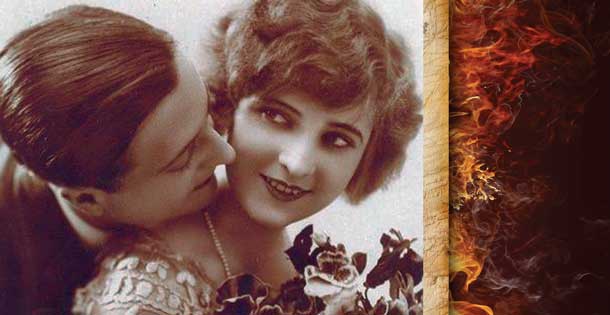
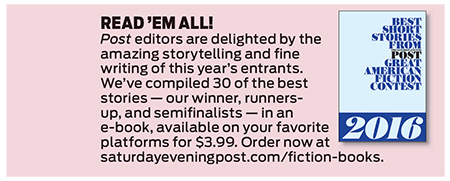



Comments
The photo you show at the top of the page is not of Zelda Fitzgerald. Do some basic research.
A wonderful story Celeste Zelda not unlike many people walking among us.